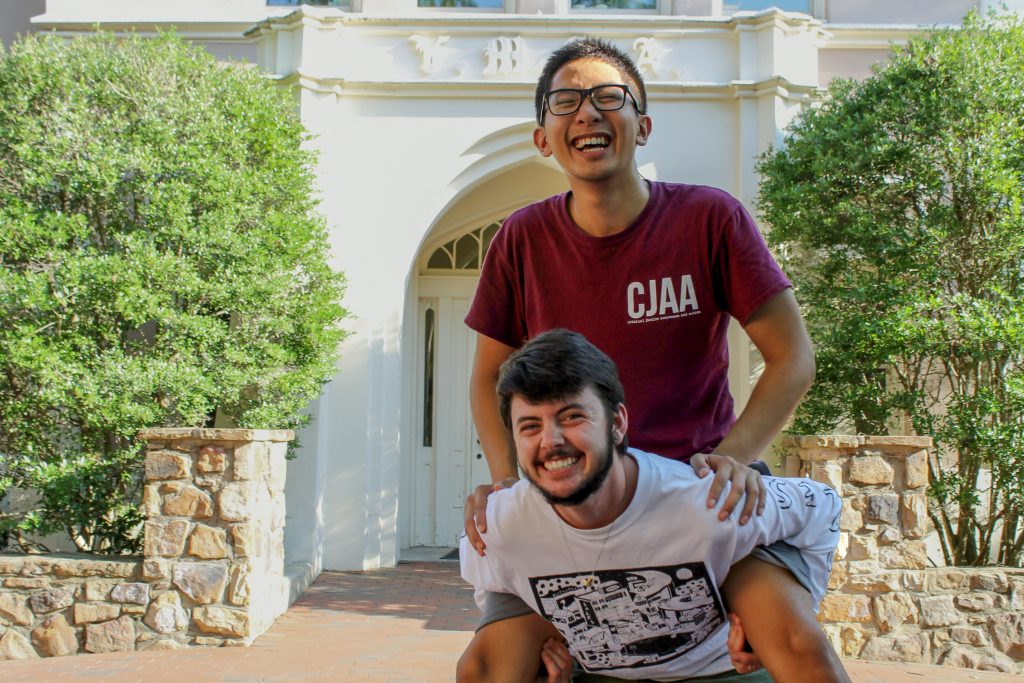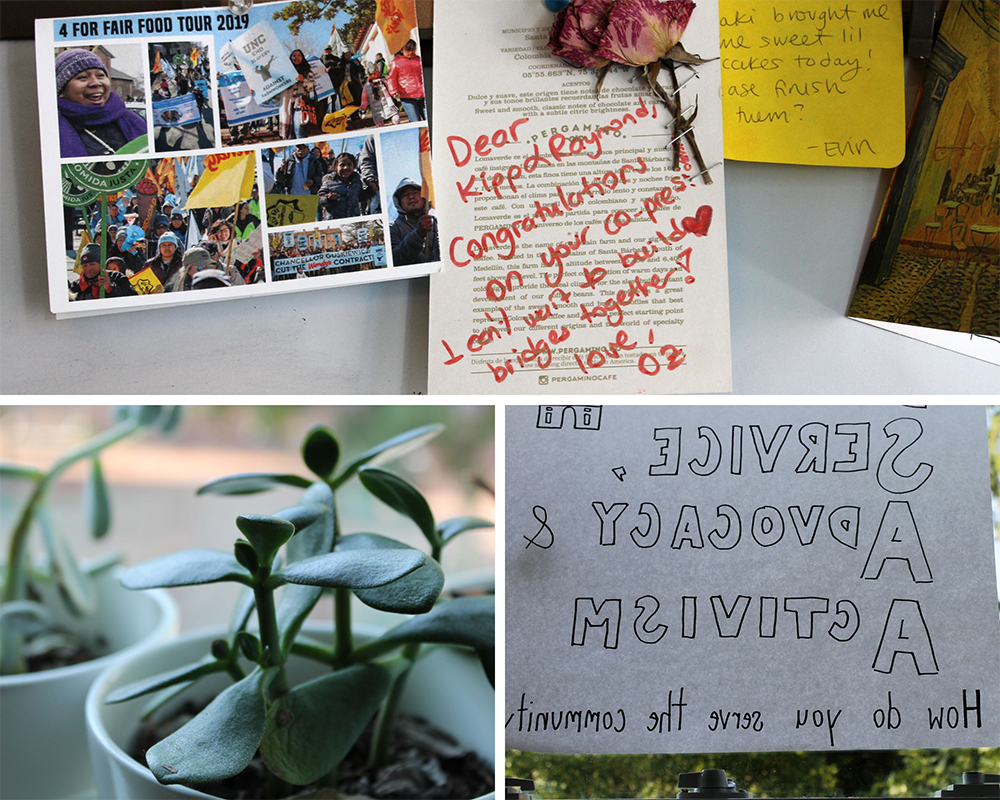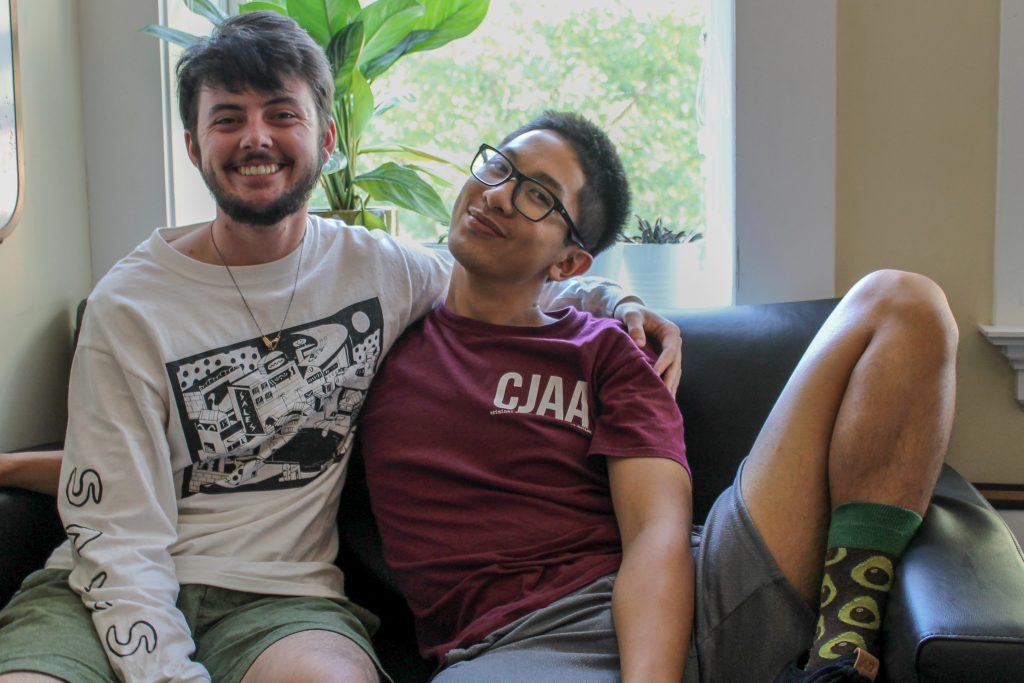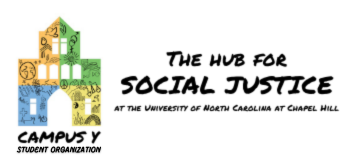Five Questions with the 2019-2020 Campus Y Co-Presidents
September 25, 2019 • • No Comments
There was no such thing as the co-presidency when UNC’s original YMCA was established in 1860. It wasn’t until one hundred years later, when the YMCA merged with the YWCA, that the co-presidency was born. Initially, the roles were shared by one man and one woman to ensure equal representation from each side of the Y, but the co-presidency looks much different today. For starters, the position is open to any two students regardless of gender identity. And the position requires student leaders to focus inwardly – supporting the Y’s 31 student-run committees and 13-member executive board – and externally – taking stands on local and international issues and connecting with other campus leaders and administrators.
We spoke with Kipp Williams (’21) and Raymond Tu (’21) to learn more about how the first six months of their co-presidency has shaped their junior years.
Q: Was there a specific moment that made you want to take on a leadership position at the Y?
RT: For me, it was really when I felt that I had a sense of belonging in the Y. In the Y, I could be all of my different identities at once, whereas in some other student organizations I didn’t feel comfortable being all the different parts of my identity in one place. I think the Y’s intersectionality really allowed me to be the person that I am. I want it to feel that way for more students of color and more queer students of color in the future.
KW: For me, there wasn’t a single moment. But during my first year, I looked up to the co-presidents at the time. They were my role models and they still are. I still admire and respect them so much. There are such great leaders, role models, friends, and mentors in the Y. The reason I got more and more involved was because of the people that I found. What we do here matters and I wanted to make my contribution to that.
Q: What do you like or dislike about serving as co-presidents?
RT: Being able to have met the leaders and members of different community organizations, committees, and student groups has been such a privilege and a good learning opportunity for me. I really like being able to see the different perspectives they have to offer.
KW: I am now painfully aware of how difficult and slow change-making is. Especially when it comes to issues where there’s institutional pushback. When you’re trying to change systems of oppression, it can be really daunting and disheartening because you have more failures than you have successes. And when you do have a success, it’s tiny.
It’s really easy to look back on history and say, ‘They did it. The leaders of our past were able to make change. Why can’t we make a difference now?’ And it’s really difficult to realize that we won’t ever really understand what our impact is. Even twenty years from now, we won’t be able to look back and say, ‘Did what I do lead to what exists now?’ That’s something that’s really hard.
That’s related to what I like about being co-president. I have learned and grown so much as a person in the past six months. I think I’ve learned more about myself, about working on a team, and about the world during the past six months than I have in the past nineteen years of my life.
Q: What does a co-presidency give you that a single leadership position would not?
RT: Kipp is always, always there for me, even when he’s not. When I was abroad this summer, we still worked together to fulfill our Campus Y responsibilities and also checked in on one another to make sure that we were taking care of ourselves. More so than just being business partners in a nonprofit, this is a friendship and a bond that I don’t think I’m going to be able to lose.
KW: We’re friends for life.
The only thing I would add to that is that Raymond checks me and I check Raymond. In terms of the decisions we make and how we approach things, it’s good to have two minds rather than one because our experiences and perspectives are different. That’s such an advantage, especially when dealing with things that neither of us have dealt with before. We need to rely on each other’s experiences and instincts and skillsets in order to do a good job.

Q: What social justice issues are you focusing on this semester?
RT: I think an important project we’re trying to work on is, now that Silent Sam is gone, where do we go?
The first-years on campus have never seen [the statue] before. They don’t know a whole lot about it. Even the sophomores this year, they saw it for maybe a day and then it was torn down last year. So, we have to address the issue of memory. How do we make sure that the actions and the efforts made by activists in the past don’t go to waste and it doesn’t get swept away with history? How do we make sure younger students today and students in the future understand that there are still issues we have to fight for on campus and there are still injustices? It was a small victory to have Silent Sam taken down, and I think there’s still a lot more to do.
KW: Also, just reckoning with the long, continued history of racism at this university. We’re both in this class right now called “Race and Memory,” and it’s looking at the history of the university and talking about race. In the past three weeks I’ve learned that the university made a lot of its money, in the beginning, from obtaining escheated slaves and selling them. The university was an active participant in the slave trade and benefitted from slavery in numerous other ways.
We just learn more every week about things that everyone should know, but we’re just now learning in this class. So, I think we’re definitely going to bring that to the table this semester. As we learn, we want our peers to learn as well.
Q: Has your time at the Campus Y changed or influenced what you want to do after graduation?
 RT: Oh, for sure. I’m a public health major and I’ve been on-and-off pre-med for like twelve years. Before this, I’d been struggling with how to fit my social justice work into medicine and public health. But I’ve come to the realization that in a way, you can think about public health as social justice.
RT: Oh, for sure. I’m a public health major and I’ve been on-and-off pre-med for like twelve years. Before this, I’d been struggling with how to fit my social justice work into medicine and public health. But I’ve come to the realization that in a way, you can think about public health as social justice.
Public health is making sure that everyone in the world has the right to human health, and that can’t happen, especially to marginalized populations, without us taking down barriers to health. Learning about criminal justice and how it affects the health of mothers and pregnant people in prisons, and environmental injustices and how they affect the health of indigenous populations and black populations in North Carolina, has been key.
There are so many of these nuances and relationships between social justice issues that we can find in public health. And that’s really helped me in deciding that I want to play a larger role not just in primary care, but in helping develop community-based interventions and policies that work alongside these marginalized populations.
KW: I know that whatever I do, I want to have the largest, most positive impact that I can on the world. And I don’t really know what that means or where that’s going to take me. After my year of being co-president, my focus will shift to another organization that I’m in called Queer Hack.
With Queer Hack, we’re trying to shake up the tech industry a little bit and make it more representative and inclusive of queer people. So, we are planning the first Hack-A-Thon in the nation, as far as we can tell, that’s organized by and for queer students. I’m really excited about that.
I am critically aware of all of the different problems in my community and I want to do something about them. I’m going to try exploring the tech side to that, but a real possibility is that I might try that and say ‘This is not what I want to do with my life,” and I might end up back in non-profit or politics or something in the public sector.
I know if I’m not happy with what my impact is, I’m going to change what I’m doing. And I’m not going to let myself get stuck in a career that’s just about making money. I won’t be happy if I do that.
This interview has been edited for length and clarity.

